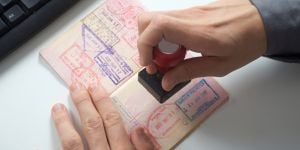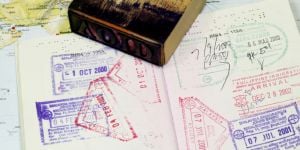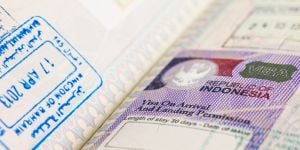
The rejection rate for student visas tends to be low compared to work, talent and investor visas. However, you can still get rejected if you neglect to submit all required documents, have suspicious financial records, show inadequate language skills, have an unclear purpose for entering the country, or fail to meet vaccination requirements. Here are mistakes you should avoid to ensure your student visa won't be rejected.
Not submitting all the required documents or submitting documents with errors
Unfortunately, visa applications involve cumbersome bureaucracy. This is why some students prefer paying an agent to help them retrieve all the necessary documents they need to attach to their application form, fill in that form correctly, and pay all visa-related fees.
Generally, the staff at the embassy or visa application service center will also quickly check if you've attached all of the required documents. However, they won't have the time to verify every single detail – that is up to you or your agent to check beforehand. Document-related mistakes that can result in your visa getting rejected can be:
- The information on the application form does not match the information on your passport and sponsorship documents. Your name must appear in the same order as on your passport, and you musn't omit your middle name if it's on there. You must write down the information about your university (name, address, type of institution, sponsor number, etc.) correctly. Typos and “silly” spelling mistakes might result in your application getting rejected or your visa getting issued with incorrect details, which will later get you into trouble with the immigration authorities.
- You did not verify the checklist of documents specifically needed for applicants from your country. While there are key documents that all international students need to submit (e.g., passport, letter of admission), students from some countries need to submit additional documents. This depends on the diplomatic relationship between your home country and the country you've chosen as a study destination. If you're from India, you need to verify the checklist for international Indian students. If you mistakenly verify the checklist for international Canadian students, you might omit important documents for Indian students, like proof of funds or standardized language test results.
- You didn't get the attached bank statements attested. Unless they're eligible for a waiver, international students are generally required to submit their bank statements to the immigration authorities to prove that they have enough money to live for at least a year in the country where they're going to study. These statements must be stamped and signed by the issuing bank to confirm their authenticity. Merely downloading your statements from your Internet banking account will not do.
- The grade transcripts and high school or degree certificate attached to your visa application are not final and official. Official transcripts are generally signed and stamped by the university, and there must be no pending grades.
Not having sufficient funds on time or having funds from a suspicious source
There are certain conditions that the money you'll be using to fund your studies and your time abroad must comply with. These conditions usually are:
- The funds must be in your bank account, your parents' account, or with an approved institution that's giving you a scholarship. It cannot be in the account of another relative like an uncle or in the account of a friend – that will get your visa refused. An approved institution giving you a scholarship can be a government, a university, or a recognized foundation (e.g., the Mastercard Foundation). Your visa might get rejected if that institution is not well-recognized.
- You must have had those funds for at least a few months. It will look suspicious if the funds are deposited in your account too close to the time of your application.
- There must be a clear source for your funds. Your bank statements must show proof of regular income from a salary, from the payment for freelance services, from dividends and/or from rent entering your or your parents' account over the years. If you've received considerable inheritance money or money from the sale of property, that must also clearly show on your bank statements. The lack of a clear source for substantial savings will make you fall under suspicion of having obtained it illegally or unethically, which will get your visa rejected.
- You must carefully check how much the country's government and your university require you to have as funds. Their minimum might be higher than what you'll actually spend there. For instance, even if you've managed to find accommodation that charges only $400 per month, the university or government might require funds that prove that you can pay $600 in rent if that's more of the average in that country.
Not meeting language or communication requirements
To obtain a student visa, you must demonstrate intermediate to advanced proficiency in the country's official language, which is also generally the medium of instruction you'll be learning through at university.
You must usually submit your results from a standardized language test like the IELTS and TOEFL for English-speaking countries or the DALF and TCF for French-speaking countries.
Depending on your university's flexibility and the country's diplomatic relationship with yours, you might replace test scores with your high school grades in that language. For instance, some British universities allow international students from non-English-speaking countries to just show their high school grades. When these students get their CAS (Confirmation of Acceptance for Studies) to submit to the immigration authorities, it will be written on the CAS that the university has already judged their English level to be adequate. However, if you're not eligible for such a waiver, you definitely need to attach official IELTS/TOEFL scores, or your visa application will be rejected.
These standardized tests have a validity of 2 years, so if you attach results from over 2 years ago, you will be denied a visa. If the score attained is lower than the upper-intermediate B2 required for university studies, which is equivalent to a 6-6.5 on the IELTS and 70 on the TOEFL, your visa will also be denied. If you scored lower than this, you should retake the test.
If there's a visa interview, your language ability will also be assessed during it. The United States conducts a short interview of F-1 visa applicants at their local embassy. They risk being denied a visa if they struggle to reply to the interview questions in English – even if they have passable TOEFL/IELTS scores. If you are nervous about speaking in English during the interview, do practice with your friends or family before it. Don't go unprepared.
Failure to clearly explain what you intend to do on your student visa
"Misuse of Visa Purpose" is an administrative term frequently used to reject student visa applications that appear vague or lack credibility. Immigration authorities may suspect that the applicant intends to use the visa merely as a means to enter the country, without a genuine commitment to academic study.
In the United Kingdom, the Home Office has cited this concern to justify proposals for tightening student visa regulations. According to its data, 40% of the 40,000 asylum applications submitted in 2024 were from individuals who had initially entered the UK on student visas. A new reform is expected in May. However, the Home Office faces resistance from the Department for Education, which opposes additional restrictions on international students.
Suspicion of misuse can arise during the review of your application or in a visa interview, if one is required. During the interview, you may be asked general questions about the university you plan to attend, your chosen field of study, your career goals, and your intention to return to your home country after completing your education.
If your answers are vague and contradictory, you might be suspected of using a student visa to enter the country for another undisclosed purpose (e.g., clandestine work or reuniting with your online boyfriend/girlfriend). If you're suspected of not being a genuine student, your visa will be denied. This is another reason why it's important to prepare well for your interview.
For countries that don't conduct interviews for student visas, the genuineness of your intent to study will be assessed through your entire application (transcripts, work history, etc).
Failure to meet immunization requirements
This can be a very country-specific requirement. If your home country or another country you've been living in has many cases of a certain contagious disease, you'll have to get vaccinated before applying for your visa. You'll need to check the immigration website of the country you'll be studying in to see if you have any vaccination requirements. Failure to do so will likely result in visa rejection.
The United States has a blanket vaccination requirement for all international students, regardless of their country of origin. They concern common vaccines taken all around the world, often in childhood. It includes immunization against measles, chickenpox, rubella and mumps. In a broader context, a student visa may also be denied if you have a medical condition that is considered a public health risk, such as one with a high potential for transmission or associated with the risk of an outbreak.
United States: New grounds for student visa rejection
In early April 2025, U.S. immigration authorities introduced new grounds for denying visa applications. Under the updated policy, individuals whose social media content includes antisemitic material may be refused entry. The measure applies not only to student visas, but also to temporary and permanent residence permits. Crucially, it also affects those already residing in the United States, including holders of Green Cards.
The announcement follows the recent cancellation of several hundred study permits. Secretary of State Marco Rubio defended the shift, emphasizing that visa revocation now results in deportation—even for permanent residents. The move comes amid the backdrop of widespread protests in 2024 against the war in Gaza. According to the Trump administration, some demonstrations were infiltrated by groups promoting terrorist or antisemitic ideologies. Foreign students who took part in these mobilizations have come under particular scrutiny.
Universities, however, argue that most visa cancellations have not involved students with direct links to the protests. Many suspect that the policy is being used to broadly target international students, regardless of their political engagement. Since March, over 1,000 student visas have reportedly been revoked. Numerous foreign students claim their status was terminated without clear justification.
Academic institutions also report that minor issues—such as past infractions already resolved or minor legal violations—are now being used as grounds for revocation. Some affected students say they were not informed of any specific reason for losing their visa.
The matter has been taken to court. Universities have raised alarm over the political direction of recent immigration enforcement and are urging international students to exercise caution.



















